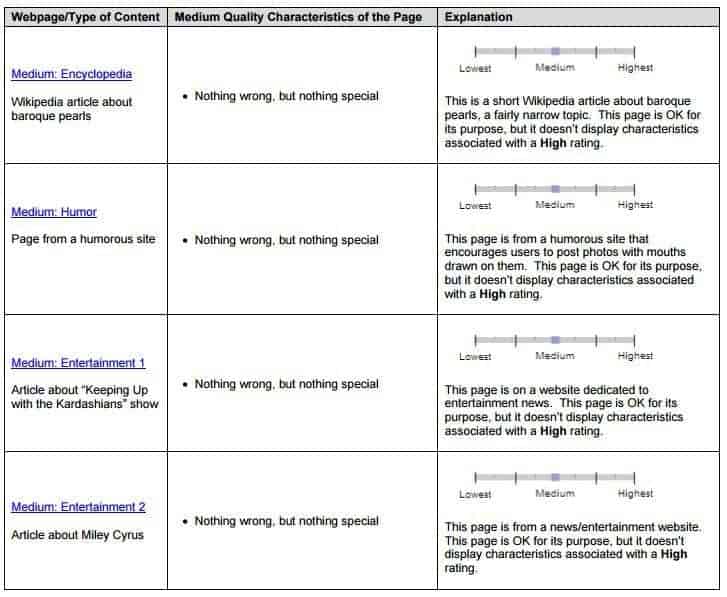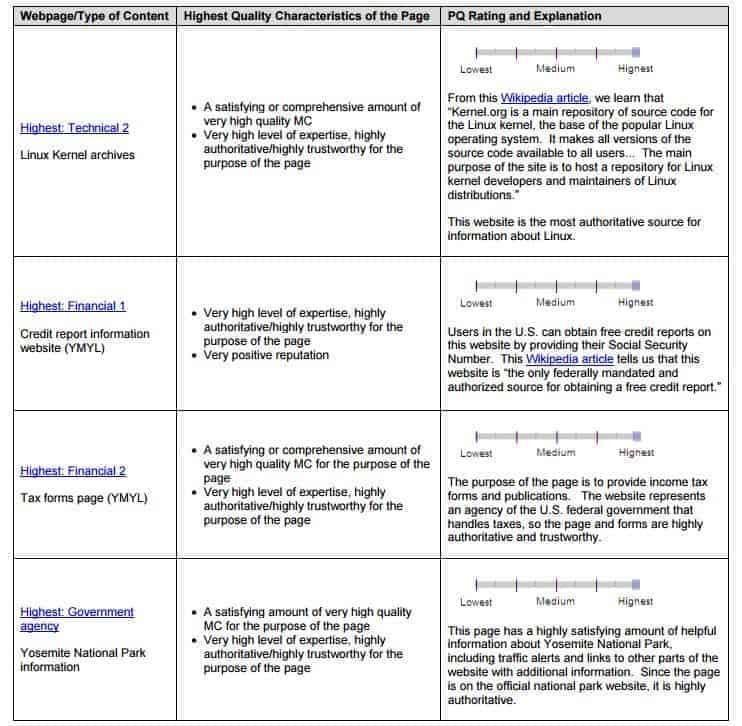
Breaking Down Google’s Quality Rating Guideline Update
Did you know that Google uses human eyes as an extra level of quality control to help assess the quality of Google’s search results? Well they do, and on November 19th, 2015 they recently updated their human rating guidelines and released them to the public to provide greater transparency on how Google works and to help people like you and me better understand what it is Google is looking for in web pages.
That was a lot of information that I just dropped on you in those last two sentences, so let’s take a step back to the first point of Google using human evaluators. Who are these people? How does one become an evalutator? Does their feedback directly effect rankings?
While I can’t answer the first two questions, Google however has shed some light on whether or not rankings are directly affected by these human evaluators:
“Developing algorithmic changes to search involves a process of experimentation. Part of that experimentation is having evaluators—people who assess the quality of Google’s search results—give us feedback on our experiments. Ratings from evaluators do not determine individual site rankings, but are used help us understand our experiments. The evaluators base their ratings on guidelines we give them; the guidelines reflect what Google thinks search users want.” – Google Webmaster Central Blog
While these “evaluations” may not directly change the rankings immediately, it’s safe to say that the things they are looking for most definitely play a part in the way Google’s search algorithm will rank things down the line. Because of this, it’s important to understand exactly how Google rates content.
So why the recent change with the guidelines? The main reason is that people search very differently across a myriad of mobile devices, thus prompting Google to make the “major revision” change. You can see the full version of this update here (PDF).

How Does Google Rate Content?
The General Guidelines document is a whopping 160 pages, but since content is the focus of my day-to-day activities, I wanted to pull out a few gems from this document when it comes to how Google categorizes and defines High Quality vs Lowest Quality content.
From the document, Google apparently categorizes content into five “quality” buckets:
- Lowest
- Low
- Medium
- High
- Highest
Let’s dig into each one to gain some very interesting insight into how Google defines and rates these quality tiers.
Lowest Quality Pages
“Websites and pages which are created to harm users, deceive users, or only make money with no attempt to help users should be rated Lowest.”
Google gives the following list of the types of websites or pages that should ALWAYS receive the Lowest rating
- Malicious pages
- Pages that lack any type of purpose
- Deceptive pages
- Pages with low quality MC
- Pages that are designed to make money with no attempt to help users
- Pages on hacked or abandoned websites
- Pages on websites creating with no expertise or are untrustworthy, unreliable, unauthoritative, or misleading
- Websites with extremely bad reputations
None of the items on this list are a surprise, but since we are focusing on content specifically, let’s dig into clarifying what Google means about pages with a low MC (main content) score.
In the guidelines, Google instructs the evaluator to consider the time, effort, expertise, and the talent/skill involved in creating the content on the page.They further clarify pages with low MC as:
- No helpful main content, or so little that the page essentially has no MC
- MC that consists entirely of “keyword stuffing”
- Gibberish or meaningless content
- “Auto Generated” content.
- Copied content
“Finally, the distinction between low and lowest quality MC is often human effort and manual curation. If you are struggling between “low quality MC” and “lowest quality MC,” please consider how much human effort and attention the page has received. Pages with lowest quality MC should be rated Lowest.”
To sum it up, it’s clear from this explanation that if your content appears to have taken absolutely no effort to create, it is basically going to be rated as having the lowest value possible to Google.
Low Quality Pages
Evaluators are instructed to give a Low rating if the one of the following characteristics exist on the page:
- Low quality MC
- Unsatisfyingly amount of MC for the purpose of the page
- The author does not have enough expertise for the topic
- The website has a negative reputation
- Page lacks helpful SC (supplementary content) or the SC is distracting
So what exactly does Google mean when they talk about authors not having enough experience?
“A warning about user-contributed content: Many websites allow almost anyone to publish pretty much anything. Contributors choose their own topics with no oversight. Contributors may have very poor writing skills or may have absolutely no expertise in the topic of the page. Contributors may be paid per article (in some cases they may be paid per word), and may even be eligible for bonuses based on the traffic to their pages. Depending on the topic, pages on these websites may not be trustworthy. However, some types of user-generated content have a high level of expertise. There are forums of experts on topics ranging from sewing to car repair to do-it-yourself home improvement projects.
User-posted content can be highly trustworthy for many everyday topics. In fact, for some unusual hobbies, the most expert advice may exist on blogs, forums, and other user-generated content websites. For such topics, try to gauge the experience and expertise of the author(s) to decide if the page is trustworthy. Please value everyday expertise and experience for everyday topics. Lacking appropriate E-A-T is sufficient reason to give a page a Low quality rating.”
While this explanation makes sense, it’s clear that the evaluator has to do a little digging around to learn more about the author, what the purpose of the site is, and if the person writing the content has the necessary credentials and experience to be valued as an authority on the topic.
I’m sure these people don’t spend tons of time doing this, but then again I could be totally wrong on that. This point goes to show how important it is to spend time on the little details on your website to put your best foot forward so-to-speak and make sure that you come off as an authority in your writing.
It’s also important to note that Google treats business websites and personal websites differently.
“We have very different standards for pages on large, professionally-produced business websites than we have for small amateur, hobbyist, or personal websites. The type of page design and level of professionalism we expect for a large online store is very different than what we might expect for a small local business website.”
Medium Quality Pages
For pages that have a mix of low and high quality characteristics, Google has saved the Medium quality score to give to them.
To better illustrate what would constitute a Medium score, here is a snippet of one of the many table chart examples that they give:
High Quality Pages
Google deems a High quality pages as one that has the following characteristics:
- Satisfying amount of high quality MC
- Authoritative, expert, and trustworthy
- The website has a good reputation
- A satisfying amount of information
- SC that contributes to the user experience
- A well maintained website
So what exactly is a “satisfying” amount of MC on a page? Once again, Google gives some examples:
SC content should be helpful to the content and purpose of the page. The example is given of a recipe site having a calculator feature that can quickly divide the recipe to make the right amount of food based on the number of people you select.
This begs the question of whether or not SC is required in order to receive a High quality rating. Google answers this with the following:
“A page can still receive a High or even Highest rating with no SC at all.”
This means that while some features are neat to show on a page, unless they help the user to better engage and experience the content on the page, it may be best to leave it out.
Highest Quality Pages
At last we have arrived at the pinnacle of content as far as Google is concerned. So what exactly makes up Highest quality pages?
Google required at least one of the following:
- Very high MC that demonstrates talent and/or skill
- Very high level of authority, expertise and trustworthiness
- Very good reputation
Here are some examples that Google gives that meets their Highest quality mark:
So do you basically have to be a famous person in your industry in order to receive the Highest quality that Google awards on a page? Not quite:
“For some topics, such as humor or recipes, less formal expertise is OK. For these topics, popularity, user engagement, and user reviews can be considered evidence of reputation. For topics which need less formal expertise, websites can be considered to have a positive reputation if they are highly popular and well-loved for their topic or content type, and are focused on helping users.”
Conclusion
While Google’s robotic algorithm does a pretty great job serving up search results, it is interesting to learn the different factors that Google needs the help of a human eye to rank.
This insight is extremely valuable to any content marketer or SEO that is working on their content strategy to better understand what they need to make sure to incorporate in their content.
The key takeaways from this guideline analysis are that you should make sure your content is useful, shows that it took time to write, is on point with the purpose of the website, and is backed by authors who are an authority on the subject. I know this is easier said than done, but it clarifies the end goal for any content creation that truly wants to succeed.
I want to hear from you! Was there anything else in the guideline update that you felt was eye-opening? Share it in the comment section below!
- The Google Quick Answer Box: What, Why and How? - December 20, 2023
- Top 10 Link-Building Strategies for Content Marketers - July 12, 2023
- 8 Types of Ecommerce Content You Should Start Using - May 15, 2023





